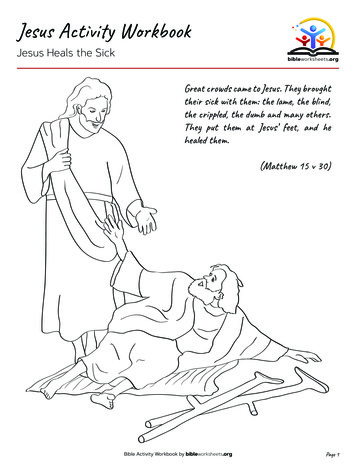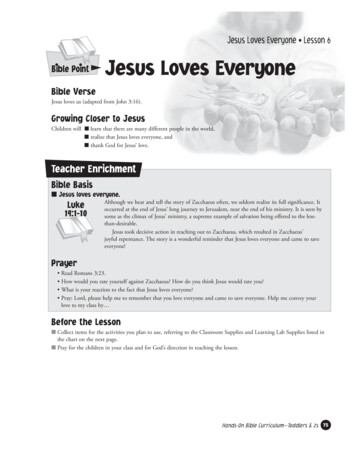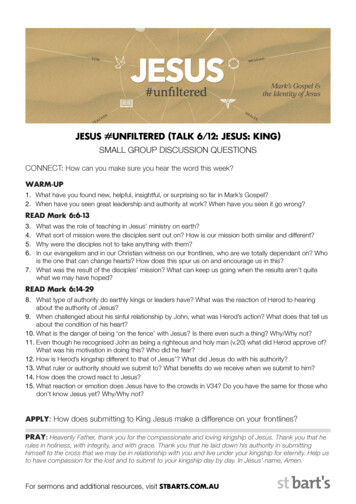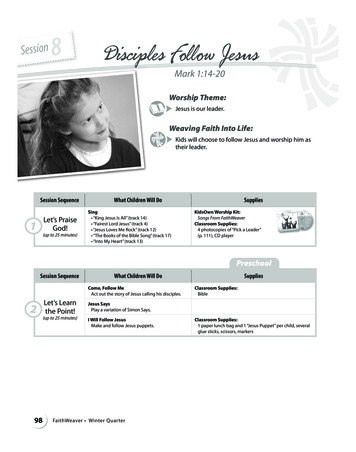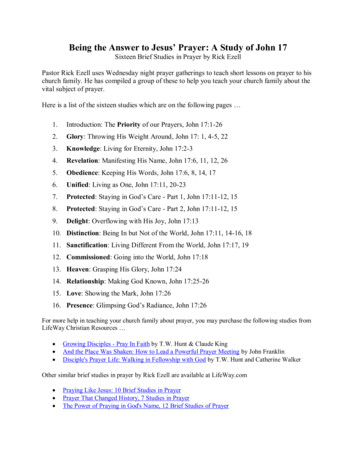
Transcription
Being the Answer to Jesus’ Prayer: A Study of John 17Sixteen Brief Studies in Prayer by Rick EzellPastor Rick Ezell uses Wednesday night prayer gatherings to teach short lessons on prayer to hischurch family. He has compiled a group of these to help you teach your church family about thevital subject of prayer.Here is a list of the sixteen studies which are on the following pages 1.Introduction: The Priority of our Prayers, John 17:1-262.Glory: Throwing His Weight Around, John 17: 1, 4-5, 223.Knowledge: Living for Eternity, John 17:2-34.Revelation: Manifesting His Name, John 17:6, 11, 12, 265.Obedience: Keeping His Words, John 17:6, 8, 14, 176.Unified: Living as One, John 17:11, 20-237.Protected: Staying in God‟s Care - Part 1, John 17:11-12, 158.Protected: Staying in God‟s Care - Part 2, John 17:11-12, 159.Delight: Overflowing with His Joy, John 17:1310. Distinction: Being In but Not of the World, John 17:11, 14-16, 1811. Sanctification: Living Different From the World, John 17:17, 1912. Commissioned: Going into the World, John 17:1813. Heaven: Grasping His Glory, John 17:2414. Relationship: Making God Known, John 17:25-2615. Love: Showing the Mark, John 17:2616. Presence: Glimpsing God‟s Radiance, John 17:26For more help in teaching your church family about prayer, you may purchase the following studies fromLifeWay Christian Resources Growing Disciples - Pray In Faith by T.W. Hunt & Claude KingAnd the Place Was Shaken: How to Lead a Powerful Prayer Meeting by John FranklinDisciple's Prayer Life: Walking in Fellowship with God by T.W. Hunt and Catherine WalkerOther similar brief studies in prayer by Rick Ezell are available at LifeWay.com Praying Like Jesus: 10 Brief Studies in PrayerPrayer That Changed History, 7 Studies in PrayerThe Power of Praying in God's Name, 12 Brief Studies of Prayer
Being the Answer to Jesus‟ Prayer: A Study of John 17Page 2 of 32Study 1Introduction: The Priority of our PrayersJohn 17:1-26“I‟m praying for you.” When I hear those words I feel a quite peace come over my soul. I knowthat the person who utters those words care for me. I am touched for those are tender and kindwords, akin to the words “I love you.”What if Jesus said, “I‟m praying for you”? How would that make you feel? You know he did saythose words and he did (and continues) to pray for you and me. Jesus said, “I pray for them” (v.9). Jesus uttered those words in what is commonly known as “The High Priestly Prayer.” Thisprayer was prayed just before Jesus was betrayed and arrested. Knowing that his death wasimminent, you and I were on his mind. How‟s that for love? With the world shouting that he wasa failure, and death knocking on his door, he intercedes before God for you and me. How‟s thatfor compassion? His thoughts during the final moments on earth are not on himself, but onothers.This prayer is the greatest prayer every prayed and the greatest prayer every recorded. John 17 isone of the highest mountain peaks of scripture, one of the loftiest passages in the entire Bible.The words are, indeed, sacred. They reveal the heart of Jesus in a unique way.This is unquestionably the Lord‟s Prayer. The prayer that we often refer to as the Lord‟s Prayer(Matt. 6:9-13) would better be called The Disciple‟s Prayer because it reveals the depth ofhuman helplessness. In the prayer of Jesus in John 17, recorded by John, it reveals the height ofdivine sufficiency. Before Jesus faced the cross, he prayed for his disciples, then and now.The structure of the prayer is in three parts. First, Jesus looks upward as he magnifies the Father,knowing that his work on earth is finished (vv. 1-5); then Jesus looks outward as he prays for thewell-being and care of his disciples, knowing that he is sending them into enemy territory (vv. 619); then Jesus looks forward as he prays for the unity and holiness of the future church,knowing that the world will base their belief of God on the actions of believers (vv. 20-23).Why did Jesus pray this prayer? Obviously he was preparing himself for what lay before him andthe suffering that we would endure. But he also had you and me on his mind. He was praying forus. He knew that believers are in a war. We would face opposition as we entered hostile territory.We need his life, his words, his protection, his care, his joy, his word, his glory, his love. As apeople we need to be unified and sanctified for the world to know Jesus.With Jesus‟ prayer as a model, our prayers are to reflect the will of God, not our will. Jesus had amuch higher purpose in mind than merely taking care of our needs and wants. Through hispraying he shows that prayer‟s highest aim is not to get our will done in heaven, but to get God‟swill done on earth.
Being the Answer to Jesus‟ Prayer: A Study of John 17Page 3 of 32Study 2Glory: Throwing His Weight AroundJohn 17: 1, 4-5, 22One cannot study John 17 without addressing the subject of glory. The word glory and itsvariations is used eight times in Jesus‟ prayer, five times in the first section where Jesus prays forhimself.This word glory can be confusing. Jesus said, “Glorify you Son” (v. 2); “I have glorified You onearth” (v. 4); “I have been glorified in them” (v. 10); “they will see My glory” (v. 24).Sometimes the word is used as a noun and sometimes as a verb. What does it all mean? Thebasic meaning of the Hebrew word kabod translated glory is heavy in weight. The noun glorymeans the weighty importance and shining majesty which accompany God‟s presence. The verbglorified means to give weight to or to give honor to. “To give glory” is to praise, to recognizethe importance of another. The Greek word is doxa, which, by the way, is where we get the termdoxology. As it relates to God, it means to recognize the essential nature of his Godness thatgives him importance and weight in relationships to us humans. When we glorify someone wedisplay their dignity, their worth, their importance, their fame. And, sometimes the word glory asin verse 24 refers to heaven.Jesus prays that he would glorify the Father (v. 1). Simply stated, Jesus lived to glorify hisFather. He lived that God would be famous, that people would recognize the importance of hisFather. Did you notice in the definition of glory the word weight? We often say of some peoplewho think they are important that they are throwing their weight around. If anyone could havethrown their weight around it would have been Jesus. But instead he sought to show theimportance of God. He wanted people to understand and recognize the weighty importance ofGod in their lives. He lived his life so that God would be glorified (v. 4).Question: Do we pray and live so that people see the importance, the weight, of God? The solepurpose of our lives is to live in such a way that God is made known, that people see hisimportance. We answer Jesus‟ prayer by extending the influence of God in the world.Jesus prays that he might receive glory (v. 5). This is not a self-serving request; he‟s simplyasking to receive back what was his to begin with. Remember Jesus gave up his rights as Godand became a human, in fact, a slave, and then died on a cross (Phil. 2:6-8). Jesus laid aside hispreincarnate glory with the Father when he came to earth to be born, to serve, to suffer, and todie. Since his work on earth is finished, he is asking that his preincarnate glory be given to himagain. The reason is that the Son might glorify the Father in heaven.Imagine as difficult as it is what Jesus did. He left heaven became a human to die for the peoplehe created. If you or I became an ant to save an ant hill would not even come close incomparison to the measure that Jesus went for us. If anyone could “bask in the glory” for whatthey had done it would be Jesus. But Jesus chooses not to bask in his glory but rather reflect thatglory back to God.
Being the Answer to Jesus‟ Prayer: A Study of John 17Page 4 of 32Question: Do we live and pray so that so God can bask in glory? The chief end of many people,believers included, is to glorify themselves rather than God. Glorifying God is not theirobjective; their real goal is glorifying themselves. God is reduced to an errand boy.Jesus prays that we will receive glory (v. 22). Jesus is asking that the same glory that God gavehim will be given to us his disciples. He is praying that we will have the same kind of weight,importance, fame. That‟s an amazing thought isn‟t it? We possess the glory of God within us.There is a weight, an importance, to our beings. Not because of what we are but because ofwhose we are.As believers in Christ we don‟t have to muster up our importance, we are important because wepossess the divine nature of God himself (Romans 8:29, 2 Peter 1:4). His being resides in ourbeing.Question: Do we live and pray understanding that we possess the nature of God? The end resultof our lives is to have the nature of God so inundate our being that people see Jesus in us. Then,and only then, do we become the answer to Jesus‟ prayer.For more help in teaching prayer, consider the following resource Disciple's Prayer Life: Walking in Fellowship with Godby T.W. Hunt and Catherine WalkerHelps adults learn to pray experientially - based on prayers of theBible. Through personal, daily study and 13 weekly small-groupmeetings, you will discover practical truths to strengthen and deepenyour prayer life. Leadership materials included. (13 sessions)Includes twelve "Prayer Guides" including the following: Giving God a Reason to Answer Your Prayer Knowing God (Names of God, Names of Jesus, etc.) Prayer Identities (Examples of Bible Prayer-ers Daniel,Abraham, David, etc.) Using the Bible in Prayer Principles of Asking Dealing with Hindrances and DelaysAlso includes directions on the following: How to Memorize Scripture How to Have a Quiet Time How to Use Bible Promises Guides for Daily and Weekly Intercession Examples of Daily and Weekly Prayer ListsAvailable at http://www.lifeway.com/shopping
Being the Answer to Jesus‟ Prayer: A Study of John 17Page 5 of 32Study 3Knowledge: Living for EternityJohn17:2-3Jesus prays that we will have eternal life, which, by the way, is the foundation of the Christianfaith.Eternal life is God‟s free gift to those who believe on his Son. The Father has given to the Sonauthority over life. We saw it in creation (see John 1:2-3). We see it in his miracles (Lazarus,John 11, and the son of the widow in Nain). We see it in his statements. John 3:16, 3:36, 10:10,11:25-26, 14:6. In essence, eternal life has been given to all, but only a few receive it. Wereceive it on the basis of faith and trust in Jesus alone for our salvation.Defining eternal life is like trying to define physical life. One cannot aptly define life, so Jesusoffers us more of a vivid picture of eternal life rather than a sterile definition of it. When webegin to describe eternal life we must not think of it in organizational terms but in organic terms.It is a life. A dynamic. A relationship. It is life in Jesus Christ. It comes through Jesus Christ.Paul wrote, “. . . the gift of God is eternal life in Christ Jesus our Lord” (Romans 6:23)Eternal life is determined by relationship with Jesus Christ. Jesus said, “No one comes to theFather except through Me” (John 14:6). Eternal life is best determined by relationships. Fourrealities are present.1. The relationship is identifiable. The relationship is with “the only true God, and theOne You have sent” (v. 3). In other words, when we truly receive eternal life asGod‟s precious gift to us, then we enter into a genuine relationship with God.Amazing, isn‟t it? We who are sinners and at war with God are now through JesusChrist are brought into a relationship with the one true God.2. The relationship is intimate. Jesus says “This is eternal life: that they may know You . .” (v. 3, emphasis mine). The word know is a present tense verb, which means thatour knowledge of God continues and continues. He is referring to a personal, intimaterelationship with the living God, which grows as the years press on. The emphasis ofthe word know is not upon mere knowledge of facts. We should never undervalueknowing facts or truths concerning God, yet that his not the ultimate objective ineternal life. Eternal life is not found by just knowing facts about God, but rather byhaving a personal relationship with God through faith in Jesus Christ. For Johnknowing Jesus is to be committed to him as a living person rather than to acceptcertain facts about him. This intimate relationship grows and matures over time byour trust, obedience, worship, prayer, meditation and study in his Word, ourcontemplation of God, our sensitivities to the prompting of God‟s spirit.3. Eternal life is instantaneous. Notice Jesus says, “This is eternal life . . .” (v. 3). Theidea of eternal life does not refer to one day going to heaven. It includes heaven, buteternal life is a present reality. “This is eternal life” not “this shall be eternal life.”Eternal life demands that we see our relationship to Christ in terms of reality—that is
Being the Answer to Jesus‟ Prayer: A Study of John 17Page 6 of 32both present and to come. It is a relationship that is quality and quantity. It is bothdonation and duration.4. Eternal life is immortal. The life that God gives implies that what he has started hewill never stop. Even though we face ills, disease, and death, this life is never over forus. Our life does not consist simply in the 70 to 80 years we walk upon this earth. Wego on forever in the presence of God.The ultimate question is: Do you have eternal life? Our greatest need is not to have wonderfulmoral lives or an enjoyable religious experience or a good feeling about ourselves. The greatestneed any person has is for eternal life through Jesus Christ.For more help in teaching prayer, consider the followingresource Growing Disciples Series: Pray In Faithby T.W. Hunt & Claude KingThis revised edition of In God's Presence, helps believersdevelop intimate communion with God in prayer.Participants will learn to hear from God in prayer, respond toGod through confession, praise, worship and thanksgiving, andjoin His work through petition and intercession. Specialemphasis is given to experiencing the greater insight andauthority God grants to united prayers of agreement withothers.Leader guide included. 114 pages.Part of the Growing Disciples series.Workbook outline.Week 1: Six Kinds of PrayerWeek 2: Developing Your Prayer LifeWeek 3: Responding PrayersWeek 4: Asking PrayersWeek 5: PetitionWeek 6: IntercessionLeader Guide for 6 Small Group SessionsAvailable at http://www.lifeway.com/shopping
Being the Answer to Jesus‟ Prayer: A Study of John 17Page 7 of 32Study 4Revelation: Manifesting His NameJohn 17:6, 11, 12, 26The idea of “name” in the Bible does not mean the label by which we are called. It is a referenceto the whole person, the character and being of that person. We often close our prayers with thephrase “in Jesus‟ name,” meaning we are praying with reference to his character, his nature, andhis authority. Nothing in our character and nature would open up the doors of heaven for a holyGod to hear and, much less, answer our prayers.Jesus prays that we will be recipients of divine revelation (v. 6). This thought is reiterated later inthe prayer, “I made Your name known to them and will make it known” (v. 26). The words made. . . known means to make clear or evident to the eye. The word name refers to the character orperson of God. Jesus is stating that the character of God has been revealed to his people. And, hehas been the revealer. Jesus told his disciples, “He who has seen Me has seen the Father.”Long before the intensive security measures at airports today, a well-known author and speakertraveled extensively. He would carry his identification cards and travel documents in a poucharound his neck. On one occasion he left the pouch at home. The person at the ticket counterasked for identification. He did not have it and was told that he could not enter the gate andboard the plane. The famous man thought for a moment went off only to return in a few minutes.He had gone to the airport bookstore bought one of his books that had his picture on the backwith a bio. He showed it to the agent. The man looked at the picture on the book cover, thenlooked at the man standing in front of him, and then graciously allowed him to enter the gate andboard the plane. Evidently the official was totally satisfied that they were one and the sameperson.Jesus was the divine revelation of God. When you see Jesus you see God.And, consequently, we are changed. No person has the character of God revealed to them andstays the same. When we see God as he truly is we humble ourselves before him, we run to himfor mercy, we seek his forgiveness. We want to know him relationally.Jesus prays not only that we will reflect this divine revelation, but also that we will be protectedby divine security (vv. 11-12). Jesus wants the Father to watch over and preserve the stillimpressionable disciples. The idea of keeping is like a Shepherd, who constantly observes hissheep. His eyes are on them. He knows that they need and is ready to meet those needs. The ideaof the word guarded is a protector, who protects us from those who would seek to pervert anddestroy us.There is an interesting correlation between divine revelation and divine security. A Christian isone whom the character of God has been revealed. Divine security is extended to those “that Youhave given Me.” In other words, those who have responded to the revelation of God will be therecipients of God‟s protection. Those he saves, he keeps. Case in point, Jesus kept the elevendisciples, but did not keep Judas, the son of destruction.
Being the Answer to Jesus‟ Prayer: A Study of John 17Page 8 of 32How is this protection accomplished? We are protected by his power working in us and workingfor us, his presence both within us and without us. “In his name” points to the constant sense ofsecurity in the revelation of God.A story from the mission field reveals a small group of missionaries being threatened by a jungletribe one night. They prayed, fearful of their imminent demise. Their attackers left. Months laterafter working this tribe some became believers. One of the missionaries asked a tribesman aboutthat night when the tribe threatened. The tribesman said, “We were planning to attack, but whenwe saw the garrison of armed soldiers surrounding your campsite we withdrew.” The missionaryknew there was no army surrounding them, except that of the presence of God and his host ofwarring angels.When we pray we are to pray both for God‟s presence—to be kept; and we pray for his power—to be guarded.For more help in teaching prayer, consider the following resource And the Place Was Shaken: How to Lead a Powerful PrayerMeetingby John FranklinPrayer for the church is not a casual practice but communion betweenChrist and His body that is as intimate as communion between ahusband and a wife. And for the church, corporate prayer is not anoptional ritual but a commanded expectation. However, having aneffective corporate experience of prayer-whether in a largecongregational setting or a small group-depends on many factors.John Franklin highlights not only the theology behind powerfulcorporate prayer times but also the effective habits and practices of apraying church. Know why God especially requires corporate prayer.Available at http://www.lifeway.com/shopping
Being the Answer to Jesus‟ Prayer: A Study of John 17Page 9 of 32Study 5Obedience: Keeping His WordsJohn 17:6, 8, 14, 17Jesus did not mince words. Obedience to Christ and his words is one of the most distinguishingmarks of a Christian. Oswald Chambers stated, “Spiritual maturity is not reached by the passingof the years, but by obedience to the will of God.” Obedience is the gauge of our discipleship,the litmus test of his Lordship, and the indicator of our spiritual maturity. Baptist Pastor, PeterLord, was fond of saying, “What I believe I do and the rest is just religious talk.” As Jesusobeyed the Father we are to obey Jesus (v. 4).This prayer reveals three actions that we are to do in regard to obedience. These actions revolvearound three phrases that the disciples of Jesus have been “given them Your word,” “havereceived them (the words),” and “have kept Your word.”First, obedience begins with the attitude of the mind. Jesus prayed that we be given the Word(vv. 8, 14). This word, which is not a secret code or a hidden message, is the stated facts or truthsthat have been clearly recorded in the Bible. They have been given to us. This is the action ofGod toward us. He has given us the steps we are to take, the actions we are to follow, the life weare to live. Here, we hear the words.Second, obedience continues with the affection of the heart (v. 8). In a sense, everyone has beengiven the words of God. We are living in a day of the proliferation of the gospel. People hear thegospel, but not everyone believes. We are not to be merely hearers of the word; we are to receivethe word. We must move from head knowledge of the words to a heart understanding of thewords. In other words, it is not enough to take the words into our minds; they have to integrateour hearts. While many hear the words, not all receive the words. The words of Jesus, the wordsof scripture, only free us when we receive them into our hearts. Here, we apply the words.Third, obedience results in the action of the will (v. 6). The word kept implies the controllingaction of obedience. It shows that obedience moves from an attitude of the mind, to the affectionof the heart, to the action of the will. The whole direction of our lives is moving toward obeyingJesus Christ in all his demands upon us. That is a Christian. A Christian is not saved because heobeys; he obeys because he is saved. Here, we appropriate the words.Let me mention two disclaimers. One, Jesus is not saying that we will perfectly obey. We havesinned; we do sin; and we will sin. But, we are to be characterized by our obedience. We aregrowing, maturing in our obedience. We have kept the word.Two, neither is Jesus saying that we can claim to be Christians and live disobedient lives. Weoften call these people “carnal Christians,” a distinction Paul never intended as a new categoryfor Christians when he rebuked the church at Corinth for their sinfulness and immaturity (1Corinthians 3:1-4). We cannot and must not give unregenerate sinners a chance to callthemselves Christians without living like it. Faith is always evidenced by works (James 2).How do we become the answer to Jesus‟ prayer?
Being the Answer to Jesus‟ Prayer: A Study of John 17Page 10 of 32We recognize that prayer is a dialogue, but the God we pray to is Lord. When we come to Christwe don‟t join a democracy, we enter a theocracy. There are no volunteers who chose; there areonly servants who obey. Just as a soldier follows the commands of the commanding officer, sodo believers follow the instructions of our Master—Jesus. Sometimes, unfortunately, when wepray it is as though we are discussing our options with Jesus. Genuine prayer is surrendering tohis service.We understand that prayer that does not result in action is ineffectual. True obedience will neverlet mere listening substitute for action. Jesus desires that we do more than share our thoughts anddemands that he act when we pray. He wants us to act. Most believers are educated three yearsbeyond their obedience. In other words, they have the training, the education, the knowledge ofwhat needs to be done but they don‟t act.
Being the Answer to Jesus‟ Prayer: A Study of John 17Page 11 of 32Study 6Unified: Living as OneJohn 17:11, 20-23Let‟s not forget that Jesus prayed this prayer on the last night of his life before his death. Thisprayer stands as a citadel for all Christians to live unified and in harmony with one another.How precious are Jesus‟ words? Knowing the end was near, Jesus prayed one final time for hisfollowers. Striking, isn‟t it? With death breathing down his neck, Jesus prayed not for oursuccess, our safety, or our happiness. He prayed for our unity, as we would fulfill his purpose.He prayed that we would love each other, as we went forward to love the world to him. Heprayed for his disciples and for all those who would come to faith in Jesus Christ, becoming hisfollowers. That means you and me. In his last prayer Jesus prayed that you and I be one.The same unity personified in the Godhead (vv. 11, 21, 22). The unity that God desires for thebody of Christ is based on a unity that already exists in heaven between the three persons of theTrinity. God does not have to manufacture unity between himself, his Son, and the Holy Spirit—they‟re already unified. The Godhead is the evidence of unity.In one sense, Christians are already unified because we are a part of the same spiritual family.We enjoy an essential unity on that basis alone. Christian unity is not based on externals of theflesh but the internal working of the Spirit in our hearts, lives, and communities. God is giver ofunity. The Puritan preacher, George Newton, wrote, “There is no possibility of having peace,unless God himself bestow it; unless he bow the heavens and come down, and work it in thehearts of his people. It is beyond the power of any creature to keep the saints themselves in unityand peace, unless God himself do it.”From this reality of unity, Jesus prays for unity among believers (vv. 11, 21, 22, 23). The EnglishStandard Version translates verse 23 as “. . . that they may become perfectly one.” When Jesusprays for something four times he is making a major plea. Jesus does not take unity lightly? It isof a major concern for him. It should be for us as well.How do we become the answer to Jesus‟ prayer for unity?1. Pray with integrity for unity. We want our unity to be real, genuine, in other words, notfake or pretentious. It is easy to pray for unity and be self-righteous. If we pray for unityand are at war with another believer, we are hypocritical.2. Pray within the family, both our physical and spiritual families, for unity. Oftenindividual families are at odds with each other. Before we pray for the church family tobe unified we need to pray for unity in our family. Then, we are to pray for the churchfamily that we will reflect the unity as demonstrated in the Godhead.3. Pray in practice for unity. Pray together with other Christians for unity. It would beincongruous to pray for unity among God‟s people and do it alone. Praying togetherrecognizes our deep need for one another.
Being the Answer to Jesus‟ Prayer: A Study of John 17Page 12 of 32Is the answer to Jesus‟ prayer of unity just so there will be harmony among the brethren or isthere a deeper purpose? Of all the lessons we can draw from these verses, don‟t miss the mostimportant: Unity matters to God. The Father does not want his kids to squabble. Disunitydisturbs him. Why? Twice Jesus says that the reason we are to unite as believers is as a witnessto a watching world. Jesus prays, “. . . so the world may believe You sent Me. . . so the worldmay know You have sent Me” (vv. 21, 23). The reputation of God is at stake. When Christiansstand together in unity, they bear living proof of the truth of the gospel. A unified church willconvince people that there is a God in heaven. Unity creates belief.If unity creates belief, then disunity fosters disbelief. How can the world come to believe thegospel if those who already believe it are battling among themselves? When the world seesdenominational leaders fighting over control, or young and old members of the samecongregation dueling over worship styles, or a church splitting over the color of the new carpet,it says, “Thanks, but no thanks.” When Christians splinter over frivolous and nonessential issues,observers have reason to doubt the validity of the gospel. Is it fair to say that one of thehindrances of people being drawn into evangelical churches today is the way we treat oneanother?Paul Billheimer may very well be right when he says: “The continuous and widespreadfragmentation of the Church has been the scandal of the ages. It has been Satan‟s master strategy.The sin of disunity probably has caused more souls to be lost than all other sins combined.”Could it be that unity is the key to reaching the world for Christ?One theologian stated, “The proclamation of the gospel apart from the unity of the church is atheological absurdity.” Unity is the evidence to the world that our faith is real. May unity beevident to all. When unity is present, we answer Jesus‟ prayer. If unity isn‟t experienced, howmust Jesus feel?
Being the Answer to Jesus‟ Prayer: A Study of John 17Page 13 of 32Study 7Protected: Staying in God’s Care - Part 1John 17:11-12, 15Have you ever sent a child off to first grade? Off to college? Off to work in a big city? Off towar? What is foremost on your mind? Probably that they will be safe; that they will be protected;that they will be kept from harm. No longer under your watch or under your arms, you hope, no,you pray, earnestly for their safety.Jesus is praying for his disciples—then and now. He knows he is leaving, bodily he won‟t bewith them. He won‟t be the physical protector as he has been. He is sending them off on theirown. He is praying as any faithful parent would for their protection. He reminds the disciples ofthe following realities:First, our position is in the world (v. 11). Jesus will no long remain in the world, but his disciplewill be in the world. The word world in New Testament thought could mean one of three things: This planet we call Earth,The world of humanity or people,The world as a principle, in an ethical sense.Obviously Jesus is saying that his disciples will live on the Earth around people. But, they are tobe protected from the world values, morals, standards, ideas
Delight: Overflowing with His Joy, John 17:13 10. Distinction: Being In but Not of the World, John 17:11, 14-16, 18 11. Sanctification: Living Different From the World, John 17:17, 19 12. Commissioned: Going into the World, John 17:18 13. Heaven: Grasping His Glory, John 17:24 14. Relationship: Making God Known, John 17:25-26 15.



